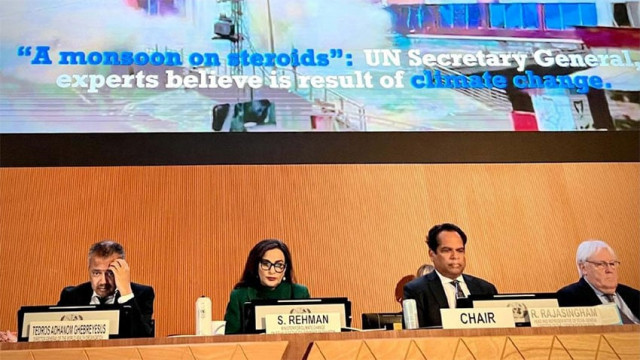UN launches revised flash appeal for floods
World body, Pakistan launch revised $816m flash appeal for flood victims

Pakistan and the United Nations on Tuesday launched the revised flash appeal of $816 million in order to respond to the needs of people affected by unprecedented climate-induced floods.
The revised ‘2022 Pakistan Floods Response Plan’ (FRP) was shared with UN member states and humanitarian organisations in Geneva.
The revised appeal urgently seeks the $816 million to respond to the growing lifesaving needs of the people – a jump of $656 million from the initial appeal of $160 million.
“This increase is a reflection of the rising needs and the unprecedented scale of destruction caused by the current climate-induced disaster which has affected a population of 33 million, cost 1,600 lives and threatens hundreds of thousands more as a second disaster looms within the first one,” said a joint statement issued by Pakistan and the UN.
Over two million homes have been destroyed or damaged, forcing people to live under open skies exposed to threats of dengue, malaria, and the biting cold of the fast-approaching winter.
More than 1,500 health and support facilities are badly damaged and unable to respond to the growing needs. 13,000 km of roads are badly damaged, making it extremely difficult – and, at times, impossible - to reach families in need.
The focus of this appeal is on the provision of urgent and lifesaving humanitarian assistance and protection to 9.5 million people until May 31 2023, with a focus on the 34 most affected districts in Balochistan, Sindh, Khyber-Pakhtunkhwa and Punjab.
This prioritisation is based on the number of houses damaged and destroyed, available projections of water level changes, and the population of displaced people in the districts. It aims to enable a more cohesive response for people in areas that have been most severely affected and to foster a focused, multi-sectoral approach.
Tedros Adhanom Ghebreyesus, director general of the World Health Organization, told the meeting Pakistan needed an urgent and robust response, supported by sustainable funding, to control the spread of outbreaks. "We are on the verge of a public health disaster," he said and added: "The water has stopped rising, but the danger has not."
He said the WHO needed $115 million to meet the health emergency.
Read Pakistan in 'second phase' of dealing with flood aftermath: NFRCC
Approximately 10% of Pakistan's health facilities have been damaged, leaving millions without access to health care, he said, adding that the stocks of essential medicines and medical supplies were limited or have been washed away.
The deluge has impacted 33 million people out of a population of 220 million, and caused damage the government estimates at $30 billion as crops, roads, livestock, bridges, houses, schools, and medical facilities were washed away.
The government and the United Nations have blamed climate change for the disaster. Julien Harneis, the UN resident coordinator and humanitarian coordinator in Pakistan said the $816 million target for the appeal was "absolutely not enough".
"We need all of these funds and we need it quickly," he said.
Pakistan is out of money to spend on recovery from devastating floods, its climate change minister said on Tuesday, urging prompt international help at the UN launch of an aid appeal as funds needed by the country were ramped up five-fold.
The United Nations revised up its humanitarian aid appeal for Pakistan five-fold to $816 million from $160 million, as a surge of water-borne diseases and fear of growing hunger pose new dangers after weeks of unprecedented flooding linked to climate warming.
The meeting was told that the U.N has received only $90 million so far out of the $160-million previous appeal for aid. "We have no space to give our economy a stimulus package, which would create jobs, and provide people with the sustainable incomes they need," the climate change minister, Sherry Rehman, told the conference in Geneva aimed at seeking aid for Pakistan.
She urged the developed world to accelerate funding for the ongoing domestic climate-linked disaster, terming it "the meta-climate event of a century".
Pakistan has already dispersed cash handouts worth $264 million to 2.47 million people affected by the disaster, she added. She said 7.9 million people have been displaced. "We are gathered here to reboot your compassion simply because the numbers are too staggering to service for any one country alone," she said.
Rehman said 8.2 million people were in urgent need of medicine, including 4% of the disaster-affected population that was pregnant, and export crops were almost all wiped out, pushing the country to import food.
"These are real people on the ground, whose eyes are still vacant from shock, who have overnight been turned into poster-children of extreme vulnerability, with futures that are entirely precarious," she said.
"All we are saying is please don't leave us alone."
Under-Secretary-General for Humanitarian Affairs Martin Griffiths in his remarks said, “People in Pakistan are bearing the brunt of the climate crisis, where catastrophic flooding has taken a devasting toll on the most vulnerable. We are now in a race against time ahead of the winter season and funding is now urgently needed so humanitarians can prepare to respond to rising health, hunger and other debilitating needs".
Minister for Economic Affairs Sardar Ayaz Sadiq said that this catastrophe was a climate warning to the world at the expense of Pakistan. He added that the losses were as of now assessed in billions of dollars, with large areas of land still inundated, making it impossible for people associated with agriculture to go back to sowing crops. He underscored the importance of saving each life, by helping the Government’s efforts for flood relief.
The United Nations Pakistan Resident and Humanitarian Coordinator, Julien Harneis said "We are now entering a second wave of death and destruction due to the floods." He added that the new funds will go towards food security, health care, clean drinking water, and sanitation.
The Chief Executive Officer of Save the Children, Inger Ashing, represented the Pakistan Humanitarian Forum at the occasion. She called on the donors to step up and fully fund this lifesaving response. She praised the efforts of the government as well as the humanitarian network in Pakistan for their relief efforts.
The Minister of State for Foreign Affairs Hina Rabbani Khar paid a special tribute to both national and international first responders and humanitarian civil society organizations who had been working tirelessly to provide relief to those in need.
She highlighted, “With our characteristic resilience and endurance, and support of the international community, we are determined to overcome this challenge and bounce back stronger. There is a long road ahead of us. We would continue to count on sustained attention and support of the international community as we transition to the huge task of sustainable rehabilitation and reconstruction.” She noted the need to equip people to not only survive but also thrive after the crises.
The international community including the UN member states, UN agencies, and international humanitarian organizations participated in the event and delivered statements of solidarity and support for the people of Pakistan, in the wake of the climate-induced catastrophe.
An initial US $160 million flash appeal was made to address immediate needs based on estimates just a month ago. The support of the international community to the initial appeal of US $160 million allowed the humanitarian community to respond to immediate life-saving needs.
However, the results of the recent needs assessments, that led to the up-scaling of the flash appeal to the US $816 million, revealed that much more was needed to save those struggling to survive the aftermath of the floods.
The Government of Pakistan, the United Nations, humanitarian and philanthropy organizations, and local communities have been working hard to provide assistance to flood-affected areas across Pakistan.
The international community has stepped forward with valuable assistance. This support has been in terms of multi-purpose cash, as well as the provision of healthcare, medicines, food, water, shelter, education, and protection. However, despite all these efforts, the unprecedented nature of the floods has resulted in a huge resource gap, which is hampering the relief efforts.
International support is crucial in complementing the ongoing humanitarian operations, as part of solidarity, commitment, and burden sharing.


















COMMENTS
Comments are moderated and generally will be posted if they are on-topic and not abusive.
For more information, please see our Comments FAQ